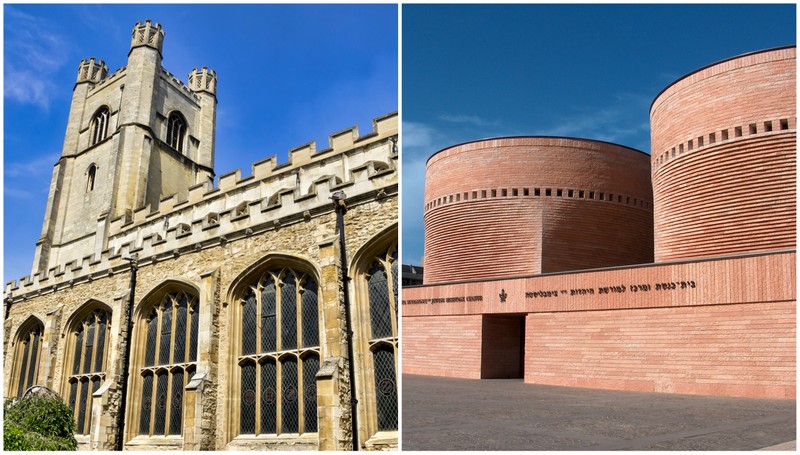A Pan-Abrahamic Dialogue
Adherents of the Abrahamic faiths account for over half of the world’s population, yet Judaism, Christianity and Islam share uneasy pasts, conflicting versions of history and clashing paradigms of truth, revelation and redemption. Amid this complex, millennia-old interaction, and ahead of the second annual TAU-Cambridge conference, Prof. Menachem Fisch discusses the evolution of the new field of Interreligious Studies, his collaboration with the University of Cambridge, and how greater insight into and respect for each other’s traditions can be achieved through a pioneering approach to the study of religion itself.
Q. The upcoming conference, “With God on Our Side: Holy War and Sacred Struggle in Judaism, Christianity and Islam,” has a foreboding title. Is jihad the focus?
We’ll be focusing on more than holy war — a dark concept shared by all three faith traditions that will be discussed in only one of the five sessions. The conference will bring together experts from around the world to discuss some of the most pressing and fascinating dimensions of religious violence. The conference is about religion and violence in general, and will discuss all forms of sacred struggle. What we’re trying to get at are the main loci of religious struggle within the three religions. Yes, jihad is associated with Islam, but what we need to understand is that each of the three religions harbors religious violence and conflict stemming from notions of sacrifice, martyrdom, and a person’s inner struggle.
Q. Which of the three faiths is characterized most by fundamentalism?
All three faith traditions contain hard core fundamentalist communities that will not engage in interreligious dialogue, and certainly wouldn’t view it as having religious value. Islam by no means stands alone in this respect. It has proven exceedingly difficult to enlist Orthodox Israeli rabbis in studying the sacred texts of Christianity and Islam. Their reluctance stems from more than politics. Christianity’s sacred texts are still considered “avodah zarah” (in its biblical context, idol worship) by many, and the thought of sitting down to study the Quran with Muslims as a religiously meaningful experience is unfathomable.
Christianity also boasts its share of exclusivists, although the Roman Catholic Church stands alone in having taken a massive and impressively doctrinal step in the opposite direction. One of the most extraordinary reforms of the Second Vatican Council in the 1960s was the declaration entitled Nostra Aetate, a religiously-motivated call to engage in religious dialogue with all other religions, with special emphasis on Judaism, Christianity’s “older brother.”
Q. What about the term “Judeo-Christian values"?
We must remember that the Golden Age of Jewish law, philosophy and study started in Muslim Spain in the Middle Ages. During this formative period, Judaism enjoyed far more meaningful interplay with Muslim thought and culture than with Christianity, even though Judaism and Christianity share a canon, which they have and still read intriguingly differently. So the term Judeo-Christian values is more of a loose catchword than a serious historical depiction of the two religions’ shared commitments.

Pictured: The Alhambra, one of the most iconic buildings of Muslim Spain, where Jews experienced a Golden Age in thought, culture and science; and the Vatican, where a new relationship between Catholicism and Judaism was ushered in during the Second Vatican Council of the 1960s.
Q. So who and where are your Muslim partners? Are there plans to expand the TAU-Cambridge partnership to include a university in a Muslim country?
It’s a tricky subject. First of all, you have to differentiate between experts in Islam on the one hand, and Muslim partners on the other. There are leading experts in Jewish studies who are not Jewish, such as the head of the Jewish Studies department at Princeton. One’s own religious commitment or ethnic background is not what we’re talking about, at least not primarily. And in that respect, TAU boasts substantial forces in Islamic Studies. In addition, TAU has forged a strong working relationship with the renowned Institute for the Study of Islam in Berlin. There are Muslim researchers, at this institute and at others, who are interested in what we’re doing, some of whom are deeply religious.
The tricky aspect has to do with the prospect of forging ties with Islamic researchers in the Arab world. In view of the current political situation in the Middle East, such ties remain indirect via our European partners. The Israeli-Palestinian conflict has complex religious undertones — undertones which our upcoming conference’s public forum will bravely attempt to explore and combat, featuring the Palestinian Authority’s Minister of Religious Affairs, Dr. Mahmoud Habash, former Israeli minister Rabbi Michael Melchior, and the Greek Melkite Archbishop of Akko, Most Rev. Elias Chacour.
Q. There are other initiatives promoting interreligious dialogue. What makes the TAU-Cambridge partnership unique?
The field of Interreligious Studies that we’re pioneering is being built on the understanding that to properly understand the three Abrahamic faiths, one has to take into account the dialogue that each is conducting with the other two traditions. We didn’t evolve separately, and we don’t exist independently. We are all part of the same, interconnected Abrahamic tapestry. It’s therefore essential that they be studied and taught within the same institutional framework, not as three separate fields of study. This is what makes our initiative unique.
This inter-Abrahamic dialogue is a complicated one. It’s conscious and sub-conscious, inclusive and exclusive, explicit and implicit. The three faith traditions — in the complexity of their thought, liturgy, social structure, codes of dress, ways of thinking and artistic expression — were and remain in intimate dialogue with each other. And the idea isn’t to achieve solidarity by abandoning or fusing our traditions, by emphasising our superficial “sameness” — a forced universalism that ignores everything that makes each religion special. We don’t need to abandon our own faith traditions in order to become closer.

Pictured: Cambridge’s Great St. Mary’s Church, and TAU’s Cymbalista Jewish Heritage Center and Synagogue. Christianity and Judaism have made enormous strides in bettering relations over the past half-century.
Q. Is the traditional field of Religious Studies therefore becoming obselete?
The TAU-Cambridge interreligious approach is intended to enrich, not undermine, the role of Jewish or Islamic or Christian Studies, or Comparative Religion, as separate disciplines. The idea is that researchers from these departments will study and teach the faiths shoulder-to-shoulder. To study the religions interreligiously is to better understand those particular formations by not only comparing the three faiths, but by attending carefully to the way in which they engaged and interacted with each other at every level.
Q. As an observant Jew, how important has your personal faith been to your involvement in the field of Interreligious Studies?
I’m both a researcher and practitioner of Rabbinic Judaism and, yes, my personal faith was pivotal in leading me to my understanding of the field. My main vocation is the history and philosophy of science, and as an outgrowth of this, I’ve also written on Talmudic literature. What fascinates me about these texts is their profound dialogical form. The Babylonian Talmud is an enormous, multi-volume protocol of an intense discussion of every aspect of religious life, rite and thought. The Talmud's dialogues of faith extend to profound disputes between rabbinic houses representative of decidedly different religious approaches, and even between matrons and prostitutes, soldiers and peasants, Roman legislators and Roman Emperors and dignitaries and many more. It’s a canon that invites its readers not to learn the truth from it, but to join the discussion and engage in it.
Q. What about the Baha’i faith? Surely they should be included in the conversation as an Abrahamic and deeply universalist faith?
The Baha’i faith is certainly a very interesting religious tradition, with interreligious aspirations. However we feel that our first priority at this stage is to establish ourselves with respect to Judaism, Christianity and Islam. Needless to say, once we’ve established the center, there is ample room for extending its research, teaching and public outreach efforts to other world religions. There is a very interesting Asian Studies program at TAU, which provides an ideal opportunity for adding new layers to the dialogue. The possibilities for collaboration and gaining deeper understandings between the world’s religions are endless, and the unique approach that we are pioneering with our Cambridge partners is sure to take us to higher levels of insight and interaction.
Prof. Menachem Fisch is the Joseph and Ceil Mazer Professor of History and Philosophy of Science, Lester and Sally Entin Faculty of the Humanities, Tel Aviv University. Born in Leeds, England, Prof. Fisch immigrated to Israel as a child. His major publications include Nature & Scripture in the Abrahamic Religions: 1700-Present; Rational Rabbis: Science and Talmudic Culture; and The View from Within: Normativity and the Limits of Self Criticism.
The second annual Cambridge-TAU international interreligious conference will take place at TAU on June 2-4. Click here for the program >>






